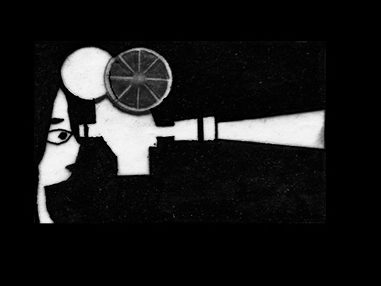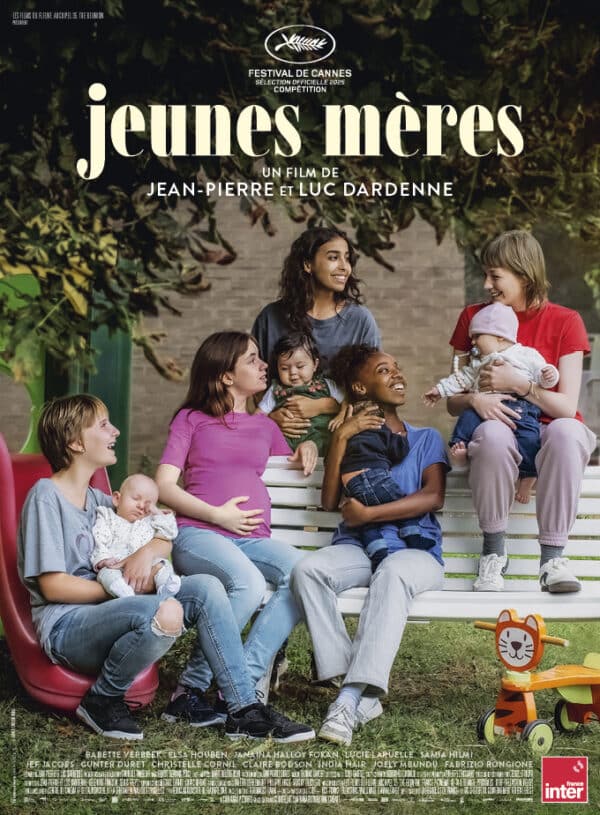Young Mothers by the Dardenne brothers: Childhood Interrupted, Motherhood as Resistance
Why this film?
Premiering in the official competition at the 2025 Cannes Film Festival, Young Mothers extends the naturalist and deeply social approach of Jean-Pierre and Luc Dardenne. Following Tori and Lokita and Young Ahmed, this new feature fits into a body of work focused on the silent struggles of society’s invisible figures — here, underage girls who become mothers. This film about teenage motherhood embodies a cinema of attention, of the tracking shot as truth, of an unflinching gaze.
A film about teenage motherhood grounded in reality. Screenplay prize at the Cannes Film Festival.
Synopsis
Jessica, Perla, Julie, Ariane, and Naïma — teenage mothers — live together in a maternal home in Belgium. Each of them tries to rebuild her life, raise her child, and dream of a future that’s often been denied them.
Origins of the film
The idea for Young Mothers didn’t start with a theme, but with a place. While researching another film about a young woman and her baby, the Dardenne brothers visited a maternal home near Liège. These centers shelter pregnant teenagers or young mothers, many of whom have broken ties with their families. Expecting to observe mere decor, they discovered a world of its own.
What struck them first wasn’t suffering or trauma, but daily life: shared meals, moments between young mothers, babies being bathed, conversations with educators, nurses, and social workers. They sensed both intimacy and social tension — a space both protective and transitional, suspended between childhood and adult responsibility. A short documentary made by a student intern acted as a trigger. That raw footage moved them deeply — a vivid, urgent fragment of real life.
From a real place to five portraits: the birth of the film
They decided to return — and then to stay. Gradually, the project evolved. No longer the story of a single mother, it became a polyphonic tale. Not a sociological case study, but a cinematic act of presence: five voices — Jessica, Perla, Julie, Ariane, and Naïma. Five teenage girls, five young mothers, five destinies shaped by solitude, fear, and a quiet resilience.
Their artistic choice was radical: to shoot inside the actual maternal home, without building sets, without artificial lighting, without dramatization. AndTheir signature tracking shot — what they call their “alexandrine” — would become the rhythm of the real. Their method — grounded in observation, rehearsal, and trust in the non-professional cast — sought to capture the emergence of the individual behind the role.
This film, they explain, is not a social tract. It’s an act of listening. These girls are connected not only by motherhood, but by a shared desire to break the cycles of absence, emotional deprivation, and structural poverty. In capturing this pivotal moment — where history can repeat or transform — the Dardennes have created one of their most humane and tender films. A cinema without slogans, but not without a cry.
Critical analysis of Young Mothers
Continuity in rupture
Young Mothers continues the Dardennes’ thematic obsessions — responsibility, isolation, transmission — while breaking away from their usual narrative form. There is no single protagonist here, but five interwoven stories. This formal shift disrupts the convention of centered narrative while maintaining emotional coherence. Each story carries its own weight, rhythm, and silence.
Direction: filming with dignity
The Dardennes film like one would accompany: with distance, with care. Their tracking shot becomes a poetic constraint that reveals more by limiting. Their rejection of artificial lighting and studio sets pushes the image toward near-documentary truth. The gaze is never voyeuristic — it’s solidaristic. Even the babies are not filmed as metaphors, but as persons, quiet resistances to collapse.
The Dardennes direct without pathos or psychological over-explanation: this film about teenage motherhood reveals without exploiting. The frame becomes a space of resistance, dignity, and nuance.
Acting: embodying teenage motherhood on screen
Most of the actresses are first-time performers, and their natural presence is disarming. Their spontaneity — enhanced by the absence of rigid direction — becomes the film’s emotional lever. Jessica, for example, evokes more through halting silence than dialogue. Special mention to Samia Hilmi (Naïma), previously seen in Clem, who delivers a performance of stunning truth.
A discreet but searing political force
This is the Dardennes’ most political film since Rosetta — but here, politics is intimate: a mother refusing to disappear, a daughter breaking the chain of inherited absence. There’s a memory of poor bodies in every frame, a generational memory of neglect and systemic violence. The film doesn’t make a case — it gives presence. And that’s enough to unsettle.
Fathers are largely absent. The young women often carry childhood trauma. And babies are everywhere, pulsing through the film like heartbeats.
A new cartography of adolescence in struggle
The mind returns to Rosetta, the Dardennes’ foundational film, where adolescence already faced survival as a moral test. Young Mothers inherits that tension but displaces it — from economic to emotional, systemic, reproductive poverty.
The Child dealt with irresponsible fatherhood. Here, the mothers are minors, but already more adult than those around them. The film doesn’t pit genders against each other — instead, it continues the moral inquiry of The Unknown Girl, where empathy was a political gesture.
But Young Mothers also enters into conversation with a wider cinema of youth in crisis. Un hiver à Yanji by Anthony Chen (Directors’ Fortnight 2024) explores adolescent ambiguity through stillness. Softie by Samuel Theis, with its muted rebellion and heightened sensitivity, echoes this quest for the unspoken. And Alice Rohrwacher’s tales of wild childhoods and fading worlds (from Happy as Lazzaro to La Chimera) offer a lyrical but equally political counterpoint to this trembling youth.
A moving film about teenage motherhood, Young Mothers stands as a necessary, quiet, and profoundly human work.
These films share the power to elevate figures of resistance where others might see only victims. A youth that refuses resignation. A cinema that connects rather than explains.
Join the conversation
Were you moved by the film? Which story struck you most? Share your thoughts in the comments or on @movieintheair. This film deserves more than a viewing — it deserves dialogue.
#filmsmay2025 #filmreview #cannesfilmfestival2025 #socialcinema #dardennebrothers #youngmothers #cinema2025
Now playing in theaters!
Cast: Babette Verbeek, Elsa Houben, Janaina Halloy Fokan, Lucie Laruelle, Samia Hilmi, Christelle Cornil, India Hair, Joely Mbundu.


